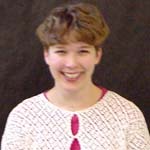|
Directed
Fieldwork & Work Study Experiences:
Krista Undeberg
March
1, 2002

How did you learn about your directed fieldwork
opportunity? How did you know what type of DFW you wanted?
I learned about my directed fieldwork during the
course of research for an independent study project. I worked with
Sandra Kroupa, Book Arts Librarian for the UW
Libraries Manuscripts, Special Collections and University Archives
Division, during winter quarter 2001 and researched websites on
Women's History. A series of links led me to the site for the Chawton
House Library, which I learned was in Redmond.
I approached Sandra with the idea of working there,
she agreed that it was a great opportunity, and we were off.
I wanted to work at Chawton because it was a type
of library experience that I had very little knowledge of. I knew
that it would be my best opportunity for working with rare books and
yet remaining in the state of Washington.
How did you go about setting up the DFW?
I left the initial contact up to Sandra; she had
worked with Kate, the director of Chawton, on several previous occasions.
Once Sandra had "cleared the way," so to speak, the three
of us met to discuss the possibilities offered by the library and
the parameters of the project.
How much interaction did you have with your supervisor?
I worked at Chawton for 1 day/week from the middle
of June to the middle of September. During that time, I met with Kate
at least once a day. I worked in person with Sandra, the "technical"
supervisor of the project about once a month. We were also in frequent
contact via email.
What kinds of things did you get to do?
My project was to complete a descriptive bibliography
of the collection of 18th century fashion and costume books. I actually
spent the entire summer composing this bibliography. I also did a
little research into the production of fashion plates (VERY tiny!)
and wrote an article on 18th century dress for publication in the
archives newsletter.
What did you learn during the experience? What kind
of training did you receive?
This was an invaluable experience. I thoroughly
loved every minute of my time at Chawton, probably because it was
such an escape from the real world! The books were so beautiful and
it almost felt like a privilege to touch them. That said, I gained
important technical skills. With so many archives and rare book collections
moving their finding aids and inventories on-line (not to mention
providing users with digital images of dubious quality), it is important
to also provide them with a thorough descriptive bibliography. This
provides them with the technical physical detailing of the book (size
and condition, for example) but it also gives them a sense of the
book's contents.
Do you feel that this experience has helped prepare
you for work in a professional setting?
Without a doubt. I feel that this experience will
be particularly useful if I seek work in an archives. It would also
be useful for museums or for image repositories.
Did this experience make you want to take any additional
coursework or seek additional training?
I have been looking at rare book schools and archival
training programs ever since! I'm also currently enrolled in the Archives
class (LIS 505) this quarter and will take Preservation (LIS 507)
next quarter
Submissions Requested
Are you interested in sharing your knowledge with
the rest of the student body? Have you attended any conferences or taken
an interesting or worthwhile class outside of the department? Would
you care to review nearby bars for us? Send your Silverfish submissions
to Ariel Johnson or John
Buell.
Edited by Ariel
Johnson and John W.N.
Buell
Silverfish Web Design by John
W.N. Buell
|


